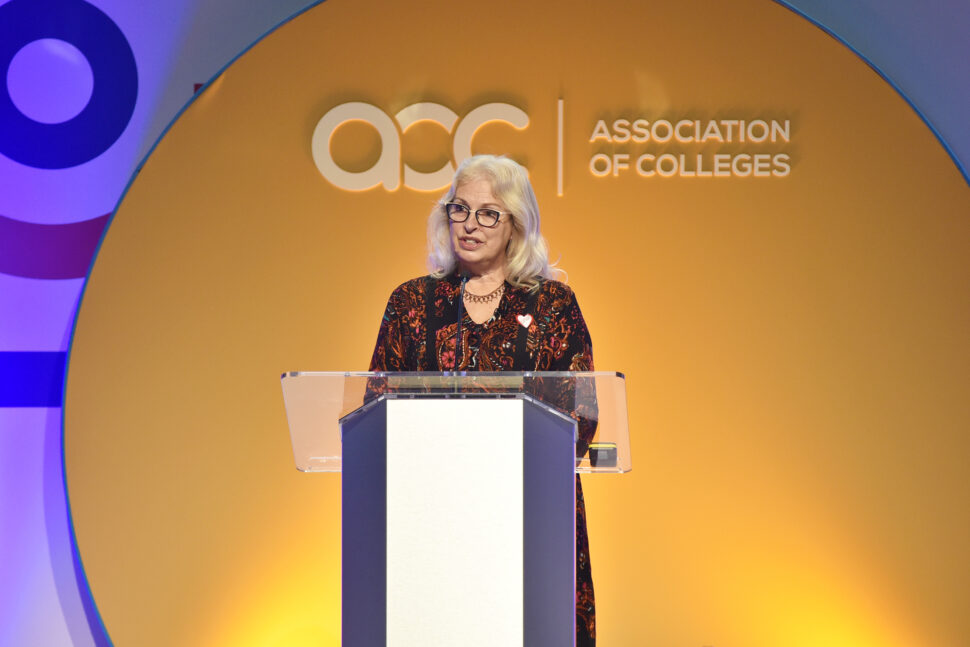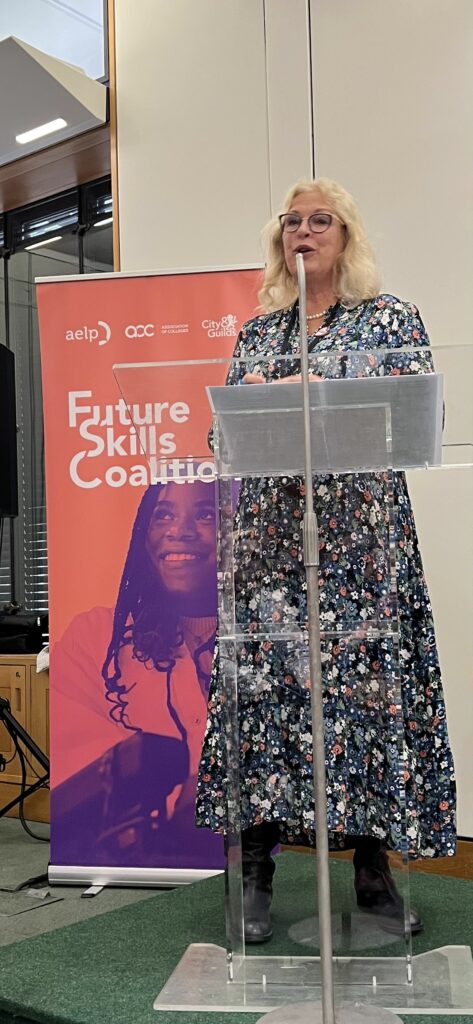Corrienne Peasgood is preparing for her mainstage address for this year’s Association of Colleges (AoC) annual conference.
This will be the second time she has addressed college leaders as the thirteenth president of the membership body.
But taking on the presidency last year very nearly didn’t happen at all.
“This wasn’t the plan, Shane. I’ll be honest.”
Peasgood’s journey from plumbing apprentice to principal, and then to president, hasn’t featured in one of this publication’s famous profile interviews, despite our best efforts.
What I’m getting on an individual level is a feeling it’s never been as tough
“I explained right from when FE Week first started, [profiles] was the one lot of articles I never really liked. To be honest, I have read other people’s but … it’s never been about me as a person.”
However, approaching retirement after nearly 30 years at City College Norwich, the last ten as principal, the spotlight finally beckoned. At her final meeting as a member of the AoC board last year, the president role, shortly to be vacated by Dame Sally Dicketts, came up and Peasgood’s interest was piqued.
“I started to think about all the skills that I’ve developed and the experiences I’ve had during my time in FE, going right back to being an apprentice in further education. So, learning in FE, teaching and being a leader in FE: what am I going to do with all of that?”
Peasgood admits she didn’t know too much about what the role involved, other than a mainstage keynote speech at the AoC conference. “That was definitely something I thought I didn’t want to do,” she confesses.
Chats with fellow principals convinced her to take the leap.
Now, re-appointed unopposed for a second term, she has no regrets about taking on the role and is preparing for what could be a momentous year for colleges.
Finding her ‘sector voice’
Peasgood could be the first AoC president to work with a Labour government since the former St Helens College principal Dame Pat Bacon held the post in 2009/10.
While Dicketts’ term in office was dominated by supporting the sector through the pandemic, Peasgood’s attention is on politics.
With extensive college experience in the bag, representing the whole sector on a national stage requires the president to quickly pick up a whole new set of skills. Early in her term, Peasgood describes how “finding my sector voice” took time.
“When you’re on panels or in meetings representing the sector, you truly have to have a broad sector voice, rather than before it would have been my college voice.”
Research, experience, and exposure to different college contexts through AoC’s regional principals’ groups helped.
And it was at this summer’s political party conferences – which saw Peasgood speaking from panels and answering live Q&As alongside ministers and shadow ministers – that she says she came to realise she had found her sector voice.
“I could not have done that as effectively at the beginning of the year,” she says.
Which is good for colleges.
Peasgood says “there can’t be anything more important than finding every opportunity to influence, to advocate and lobby for the sector in the build-up to this election. It just must be that single focus.”
Another upcoming change in education is the appointment of the new Ofsted chief inspector, Sir Martyn Oliver, who takes over from Amanda Spielman on January 1. Peasgood has some advice for him.
“I listened to his select committee hearing … I didn’t hear any reference to the broader [post-16] sector. You would think that anyone going into a new role, if they’ve got an area that they are not as familiar with it’ll be the first area that you’ve reached out to. I really hope he does that.”

Level three fears worsening
This time last year, in her first speech as AoC president, Peasgood announced her three priorities in post: “system leadership” within the sector, broadening the FE voice, and protecting student opportunities, particularly at level three.
“We need to leave as many doors open to students as possible,” she said from the stage.
Fast forward 12 months, Peasgood has stories to tell about how she’s worked on system-level policy with AoC officials and members, and on encouraging more and different principals to take to the airwaves to represent the sector.
Peasgood chairs AoC’s 2030 strategy group which guides AoC policy on “what’s the system we want to see in 2030, and what are the steps that we need to take to get there.”
Wins on the system leadership side include AoC’s ‘Opportunity England’ document earlier this year which proposed a single “tertiary” funder and regulator for all of further and higher education, and preserving apprenticeships for new employees.
But on qualifications reform, Peasgood says the outlook is looking worse.
I think we’re probably in a more challenging position than we were at this point last year
The first trench of level 3 qualifications deemed to overlap with T Levels will lose access to public funding in August 2024.
So, students that have just started in year 11 will have fewer post-16 options to choose from if they want to go on to study a subject where there’s a wave 1 or 2 T Level.
“We’ve done a lot of work [on qualifications reform] over the year. Lots of letters, lots of lobbying. I think we’re probably in a more challenging position on that than we were at this point last year.”
Peasgood says this year’s increased intake of 16-year-olds enrolling at colleges, particularly with GCSE retake requirements, makes defunding T Level alternatives even harder to swallow.
“When we look at the GCSE grade profiles of this year’s year 11s and what that’s done for the enrolments we’re seeing in colleges, the huge amount of extra students needing to re-take English and maths … I don’t think I’ve spoken to a college leader that hasn’t had to put on more level one and two provision at the expense of level three provision.”
Peasgood’s hypothesis is that declining entry-grade profiles coming through the system means the leap to a rigorous T Level could be too much for a growing cohort of young people, with colleges unable to offer level three alternatives.

“You can almost see the unintended consequences of lots of young people being channelled into provision that’s not in their best interests,” she warns.
As colleges delete swathes of BTECs and other level 3 qualifications from their websites for 2024 entrants, Peasgood feels for the parents and careers advisers guiding young people nearing the end of their school journey.
“You’ve got the tried and tested A-level route that everybody knows about. Then you’ve got a T Level route, and I’m a great advocate of T Levels for the right students in the right areas, that is still untested. We haven’t had enough cohorts of students go through all of the T Levels.”
The AoC is not a member of the Protect Student Choice campaign, a coalition of organisations, spearheaded by the Sixth Form Colleges Association, lobbying against the government’s defunding plans.
Instead, it has lobbied on this independently.
But neither has been successful in securing a government U-turn.
Indeed, the government is pressing ahead with defunding even though they’ve announced they now want to overhaul the system again by replacing A-levels and T Levels with the Advanced British Standard.
Light at the end of the tunnel
Peasgood ponders her response carefully when I ask her about her interactions with ministers and civil servants when making the case for colleges.
Decision makers are “in listening mode” she has found but admits “a skill I need to get better at” is pushing back when politicians dodge questions. When pressed, she wouldn’t name names.
Meetings with skills minister Robert Halfon have “in most instances” reflected his public passion and enthusiasm for FE. And in early discussions, his new Labour shadow, Seema Malhotra, has been asking AoC for “very sensible” requests for information.
Politics aside, Peasgood says she is interested in testing the mood of college leaders at this year’s conference.
This year’s student over-recruitment challenges come on top of existing pressures on staff retention and recruitment and continuing rising costs.
“What I’m getting on an individual level
is … a feeling it’s never been as tough on a day-to-day basis.” And being a principal is still “the best job in the world” though “can be lonely.”
Though new funding for staff pay awards and hearing colleges feature in the keynote party conference speeches by the prime minister and leader of the opposition this year, Peasgood thinks there is a, “very, very initial sense of optimism, that maybe there’s light at the end of the tunnel.”
The year ahead
Talking about legacy when you’ve just been reappointed might feel premature. Recent AoC presidents have all made their mark on the role. People remember Ian Ashman’s focus on mental health, Sally Dicketts’ interest in the future of learning, and Steve Frampton bringing sustainability in colleges to the fore.
Despite having spent the year rubbing shoulders with the movers and shakers of education policy, Peasgood retains her earlier humility.
“If people know that I really helped to lobby and advocate for the sector in the run-
up to what’s going to be one of the most important general elections for a generation, I’ll be pleased. I’ll have done what I can do.”
The AoC’s annual conference takes place November 14 to 15 in Birmingham.

















Your thoughts